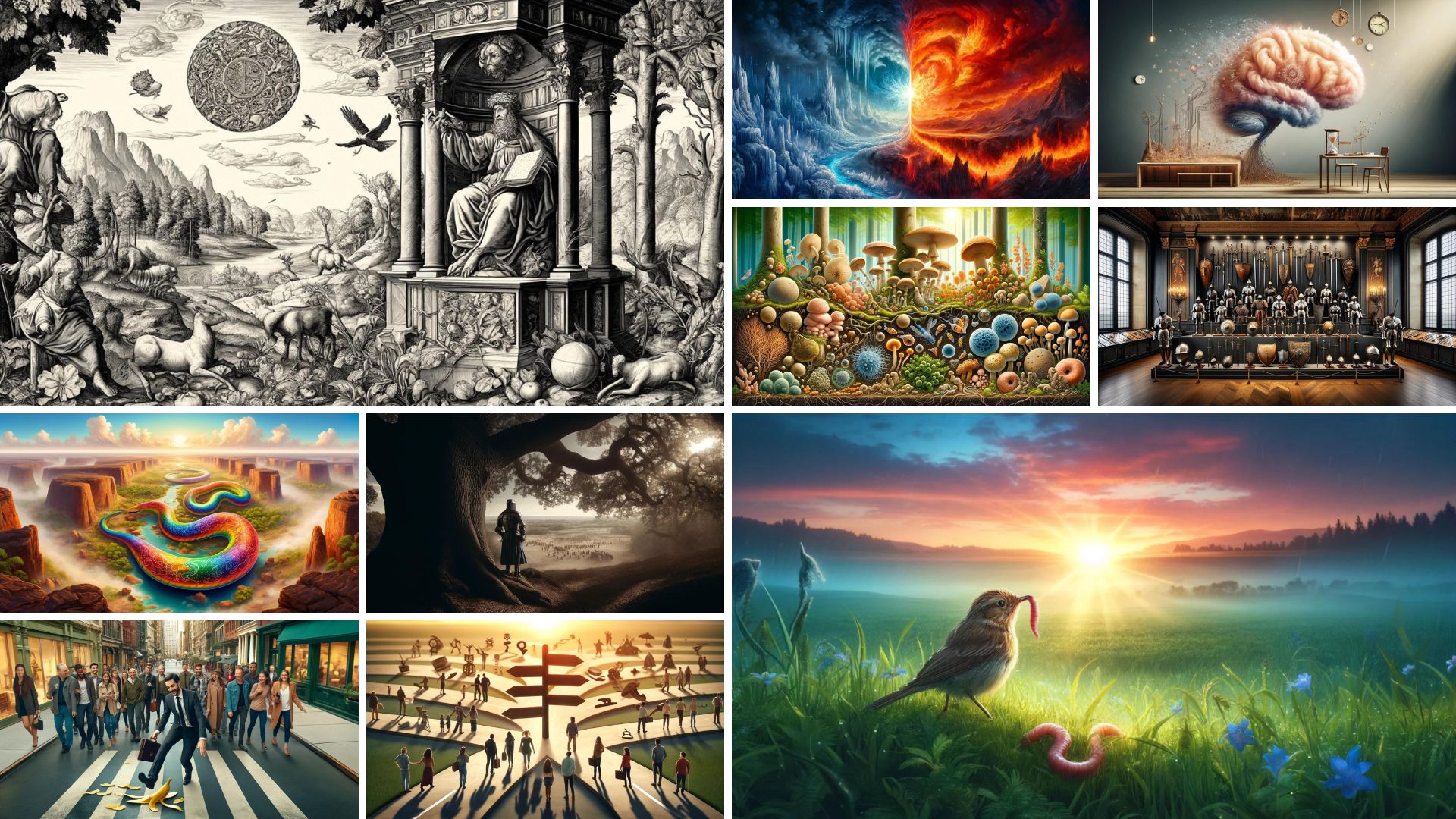Episode Audio
Transcript
Should You Run or Should You Fight?: Understanding Discretion
Have you ever been in a sticky situation and wondered – is this where I stand my ground, or is it smarter to turn around and run? Maybe someone throws an insult your way… or a situation feels a little too risky. Do you jump in headfirst or play it safe?
That age-old debate between bravery and caution lies at the heart of an old proverb with a surprising origin. I’m your host, and on today’s episode of Daily Proverb, we’re diving into the famous saying, “Discretion is the better part of valor.”
We often think of this proverb as a lesson in cowardice, don’t we? A way to justify backing away from a fight. But there’s a lot more to unpack here. Where did this saying even come from?
Believe it or not, its origins lie in one of the most famous plays of all time, Shakespeare’s Henry IV. The character of Falstaff, a comical, cowardly knight, declares “The better part of valor is discretion,” as an excuse for pretending to be dead on the battlefield. Shakespeare is using this for humor, ironically pointing out that true bravery lies in more than just blind charging forward.
So, what does this proverb actually mean? Well, “valor” is another word for courage or bravery, and “discretion” is essentially sound judgment, knowing when to move forward and when to hold back. The heart of this saying is that wise decision-making is a key element of true courage!
Think of a firefighter rushing into a burning building. That’s undeniably brave. But they aren’t just running in blindly – they’ve trained, they have equipment, a strategy. Their courage is tempered by knowledge and careful planning. Or how about a negotiator dealing with a difficult situation – they need the courage to stand firm yet be flexible and strategic, understanding when to compromise and when to be steadfast.
This proverb applies to our everyday lives too! Sometimes the bravest thing you can do is walk away from an argument. Other times, true courage is speaking up, even if your voice is shaking. Understanding the difference takes wisdom.
So, the next time someone calls you out as a coward for backing away, or you’re wondering if you should take a risk, remember this: There’s reckless abandon, and there’s wise, informed bravery. Which would you rather embody?
Let me know your thoughts on when to stand your ground, and when discretion really might be the braver choice!
Your Life: Are You the Author or Just a Character?
Imagine your life is a book… but someone else is holding the pen. Are you okay with that? Do you even know the plot, or are you just along for the ride? Feeling a little lost in the pages? The late, great Steve Jobs – visionary inventor and co-founder of Apple – left us with some sharp words on this very idea: “Your time is limited, don’t waste it living someone else’s life.”
I’m your host, and on today’s episode of Daily Quote, we’re hitting pause on autopilot and figuring out how to write your own incredible story. Are you ready to take back the pen?
Okay, let’s be honest. “Living someone else’s life” doesn’t always look dramatic. It’s not just about the person who ditches their dreams of being an artist to take over their dad’s accounting firm because….well, that’s just what you do.
It’s subtler than that! It’s the times we follow the crowd without thinking. When we buy things to impress people we don’t even like. When we choose careers based on what sounds good, not what sets our soul on fire. Steve Jobs, a man known for changing the world, wasn’t talking about pleasing our parents or following the rules for the sake of fitting in. He was talking about something deeper.
See, we all have that little inner voice, don’t we? Call it your intuition, your gut, your heart’s compass. It whispers about the things that make you feel alive, the path that feels uniquely yours. But amidst the noise – what other people expect, what’s considered ‘smart’ or ‘successful’ – that little voice can get drowned out. And that’s when we start living a life written by someone else.
But here’s the thing: no one else can write the story you were born to live. Nobody’s got your unique mix of talents, passions, and experiences. Your time on this planet, however long or short, is your precious chance to craft your tale.
So, here’s your challenge, your call to action! This week, I want you to start listening to that inner voice. What makes you light up? What dreams feel scary because they’re so exciting? Don’t worry, you don’t need to ditch your job or uproot your life. It starts small – could be finally trying that painting class, or saying “no” to a commitment that drains you. Tiny steps that remind you: You are the author of this life.
Think about it – Whose story are you going to tell?
Worms for Breakfast? The Secret Meaning of “The Early Bird…”
Okay, picture this: you’re still half-asleep, it’s barely dawn, and somebody bursts into your room yelling, “The early bird catches the worm!” Annoying or inspiring? Plus, who really wants to think about worms at breakfast?
But hold on, because this peculiar expression holds a secret about success, timing, and maybe even getting that thing you’ve always wanted. I’m your host, and on today’s English Express, we’re figuring out how waking up with the roosters might just change your life!
So, about those worms. This saying isn’t really about birds snacking at sunrise. It’s a metaphor! Think about our early bird – they’re up and at ’em, beating the rush. That worm, well, that represents opportunity – the good job, the rare bargain, the chance to shine. You get the idea!
“The early bird catches the worm” is basically the ancient English way of saying that being proactive pays off. Those who arrive first often get the best pickings. Ever been to a mega-sale where all the cool stuff is gone by noon? Yep, early bird took those treasures. Or maybe you’ve heard of those early investors in tiny startups like, oh let’s say, Apple, who became millionaires.
But here’s where it gets more interesting. It’s not JUST about waking up early (although, that does help sometimes!). It’s about being ready when that opportunity lands. Think of the early bird preparing – preening its feathers, practicing its hunting moves. That’s like you doing the prep work – studying, networking, honing your skills. See, the most successful “early birds” aren’t just lucky, they’re prepared.
Of course, there’s always a flip side. If you roll in late, all the good stuff might be gone. Too many snooze buttons could mean missing out on that dream job, or finding those concert tickets sold out.
Now, don’t panic if you’re more of a night owl than a morning lark. It doesn’t mean you’re doomed! But here’s the challenge: can you identify an area in your life where being the “early bird” might help? Maybe it’s tackling a tough project before it gets overwhelming or finally going for that promotion.
Remember, the early bird isn’t always the most talented one, but they’re often the most determined. So, how will you show up prepared and ready to seize those metaphorical worms?
Panoply: Your Word-Warrior Power-Up
Imagine having a word that makes you sound like a brilliant scholar and a medieval knight rolled into one. Imagine a word that describes both the dazzling spectacle of a royal parade and the full collection of your most powerful tools. Ready to have your mind blown?
That’s the word for today! I’m your host, and on Word of the Day, we’re upgrading your vocabulary one fascinating word at a time. Today’s word is a powerhouse that’s ready to unleash its linguistic magic – prepare yourselves for the mighty “panoply.”
Okay, let’s dive into its origins. Turns out, this fancy word comes from the ancient Greeks – from “pan” meaning ‘all’ and “hopla” meaning ‘weapons’. Picture the full armor of a Greek warrior – helmet, shield, breastplate, the whole deal. That’s the original essence of “panoply.” It described all the gear a fighter needed to be fierce and protected.
Now, this word has evolved. Because humans love taking a good metaphor and running with it, “panoply” escaped the battlefield and began describing any grand, impressive display or collection. Think of a museum displaying the glittering panoply of a king’s treasures, or even nature itself, showing off a breathtaking panoply of fall colors.
It gets even cooler! Because “panoply” hints at both protection and the tools to get things done, you can apply this to things beyond shiny objects. An artist could have a panoply of creative skills, or a politician a panoply of arguments ready to deploy. See? It’s the perfect mix of fancy and powerful.
So, here’s your challenge! This week, I want you to play word detective. Notice moments where you see a panoply in action. It could be a store window overflowing with eye-catching goods, your overflowing toolkit, or the dazzling panoply of ideas in a brainstorming session.
Can you wield this word in a sentence to impress your friends? Will you unlock the “panoply” of your own potential? That’s the power of words, my friends.
Shocking Science: Are Mushrooms Your Secret Cousins?
Okay, buckle up for a mind-blowing fact that might make you rethink your veggie stir-fry. Get this: those mushrooms? They’re closer to you than those carrots! But how can something that grows rooted in the ground be related to us? Did mushrooms suddenly grow fur? What’s the deal?
I’m your host, and on Did You Know, we serve up those knowledge nuggets that leave you amazed and a little hungry for more. Today, we’re diving into the weird and wonderful world of mycology – the study of fungi – so get those thinking caps ready!
Alright, let’s drop a science truth bomb. For years, we lumped mushrooms in with plants – they don’t run around, they grow from the earth, seems logical, right? Wrong! Turns out, appearances can be deceiving. Underneath it all, on the level of cells, DNA, and how they function, fungi are way more similar to animals like us!
Now, don’t go picturing your shiitake mushrooms growing fur. Here’s why scientists shifted their thinking:
- Cell Walls: Plants have tough cell walls made of cellulose, that’s why trees are strong. Animals and fungi? We have softer cell walls made of something called chitin – what insect exoskeletons are made of!
- Food Power: Plants can make their own food with sunlight – photosynthesis, remember? But fungi and animals? We gotta scavenge our food sources – gotta eat other things to survive.
- Ancient Ancestors: Scientists, digging into the DNA family tree, figured out that animals and fungi branched off from a common ancestor waaay before plants did their own thing. We’re more like distant cousins than we thought!
So, next time you’re tossing mushrooms into your pasta, think about it. You’re sharing a meal with a surprisingly close – if very distant – relative. Makes you wonder, if fungi can unlock the secrets of medicine, or clean up pollution, or even provide new food sources, what other hidden connections are out there in the natural world, just waiting to be discovered?
Your Brain’s Leaky Bucket: Fight the Forgetting Curve
Cramming for a test, only to blank out halfway through? Learning a new language but those words keep slipping away? Ever feel like your brain has a secret delete button, sabotaging all your hard work? Well, my friend, you’re not alone!
I’m your host, and on Know Yourself, we take a deep dive into how your amazing brain works, and why it sometimes works against you. Today, we’re fighting back against a sneaky culprit behind information loss – the Ebbinghaus Forgetting Curve.
Okay, picture this: your brain is like a bucket, scooping up new knowledge. But this bucket has leaks! German psychologist Hermann Ebbinghaus figured this out way back in the 1800s and his discovery isn’t fun: we forget things fast. Like, super-fast!
Here’s the breakdown: Within an hour of learning something new, boom, half of it might be gone. A day later? Maybe you’re holding onto only 30%. Depressing, right? This curve shows how our brains just aren’t wired to store random information long-term. It’s a use-it-or-lose-it situation!
But here’s the good news – there’s a way to patch that leaky bucket! The trick is called “spaced repetition.” Think of it like topping up the water level. Turns out, reviewing information at strategic intervals – right when you’re about to forget – strengthens the memory. Each time you revisit something, the forgetting curve flattens out, meaning it sticks around longer.
The secret to making knowledge stick isn’t just hard work, it’s smart work. That means reviewing your notes, quizzing yourself, or even teaching someone else what you’ve learned.
So, next time you’re feeling frustrated that you can’t remember everything, don’t blame yourself. Blame that pesky forgetting curve! But here’s the challenge: can you outsmart your brain? Try using spaced repetition with something you want to learn – see if you can beat the curve and make knowledge last longer.
Remember, your brain is amazing, but it works in mysterious ways. The more you understand it, the better you can harness its power
Land of Dreamtime: Where the Rainbow Serpent Roams
Imagine a time before time, a world where the land was flat and asleep. Now, picture a colossal creature, its skin a blaze of shifting colors, slithering across the barren earth. Are you witnessing the birth of a legend? Or something deeper, more fundamental?
I’m your host, and on Great Stories, we journey into the heart of myths and folklore, exploring the ancient tales that still shape our world. Today, we venture to Australia, to uncover the secrets of the Rainbow Serpent – a magnificent spirit whose story winds through the very soul of a continent.
In Aboriginal Australian Dreamtime, the land was born out of the Rainbow Serpent’s travels. This wasn’t just a snake, mind you. This was a being of creation itself, so vast its movements carved mountains and rivers, its body shaping the world as we know it.
Think of the Rainbow Serpent as spirit and force of nature all at once. It’s associated with water – life-giving rain, deep pools, swirling billabongs. Water, in the harsh beauty of Australia, is precious, sacred. So, the Serpent is not just a creator, but a protector– one to be revered, and sometimes feared. Some Aboriginal traditions warn that if displeased, it can unleash drought or floods.
The Rainbow Serpent isn’t confined to ancient stories. It’s woven into Aboriginal art, a vibrant, serpentine form that speaks of the deep and unbroken connection between humans, nature, and the unseen forces swirling in the universe.
The symbolism goes deeper. The Serpent represents fertility, renewal, the endless cycle of life. Its shimmering colors echo the rainbow, linking to that ancient symbol of hope and transformation. And within various Aboriginal cultures, the specific details of the Rainbow Serpent, its name, and its stories shift, telling us how tightly Dreamtime beliefs are woven into the landscape itself.
The Rainbow Serpent reminds us that stories aren’t always just for entertainment. They preserve wisdom, explain the natural world, and guide how a people see themselves in the grand scheme of things. So, the next time you see a rainbow arcing across the sky, maybe spare a thought for that magnificent Serpent of the Dreamtime. Does its shimmering form hint at ancient mysteries, and a connection to the land deeper than we might ever fully understand?
Albrecht Dürer: The Artist Who Changed How We See
Imagine a time before cameras, before Instagram filters. Picture a world where images were crafted painstakingly by hand. Now, imagine an artist so skilled, his work was mistaken for reality! An innovator whose influence still shapes our world… even if you’ve never heard his name.
I’m your host, and on Immortal People, we dive into the lives of those who’ve left an enduring mark on history. Today, we spotlight an artistic visionary who captured the world in stunning detail, revolutionizing not just art, but our very perception – Albrecht Dürer.
Dürer lived in Germany during the 15th and 16th centuries, the heart of the Renaissance – a time of intellectual explosion and artistic revolution. He wasn’t just a gifted painter, but a master of both woodcut and engraving printing techniques. This is key, because his art wasn’t just for the wealthy – it could be reproduced, changing everything!
Dürer’s brilliance lay in his eye for detail. He painted flowers so lifelike, it’s said insects tried to land on them. His engravings captured the texture of fur, the glint of metal, the intricate folds of cloth. This wasn’t just pretty, it was a breakthrough in visual realism, reflecting that Renaissance thirst for knowledge.
He was also a self-promotion genius! We see this in his iconic “AD” monogram, one of the earliest artist trademarks. Dürer’s drive for fame and success is modern; he wasn’t just an artisan, but an individual expressing himself through art.
Think beyond museums: Dürer’s influence is everywhere. His studies of human proportion shaped how generations of artists see the body. His love of nature inspired scientific illustration. His technical mastery paved the way for mass printing of images, the key to spreading ideas across Europe.
Next time you snap a picture, edit it with the touch of a button, or marvel at photorealistic art, remember Dürer. He helped lay the foundation for how we see, making us hungry for visual detail, eager to capture and share beauty.
So, how much has his work shaped your own way of observing the world? The next time you’re out in nature or browsing amazing art online, give a thought to the artistic pioneer who helped make so much of our visual experience possible.
Passion, Destruction, and the End of the World: Decoding Frost’s “Fire and Ice”
Have you ever thought about how the world might end? Would it be a fiery explosion or a silent, creeping freeze? What about the power of our own emotions, those burning passions, that chilling hatred…could they be just as destructive?
Today on Daily Poem, we’re diving into one of the most famous, and most debated poems in the English language – Robert Frost’s chillingly short yet incredibly powerful, “Fire and Ice.”
Frost, a master of New England landscapes and the dark undercurrents of human nature, published this poem in 1920. It’s a mere nine lines, but those lines are packed with meaning.
Fire and Ice by Robert Frost
Some say the world will end in fire,
Some say in ice.
From what I’ve tasted of desire
I hold with those who favor fire.
But if it had to perish twice,
I think I know enough of hate
To say that for destruction ice
Is also great
And would suffice.
Let’s look at the classic debate first – is it about the literal end of the world? Frost himself hinted at astronomical inspirations. Imagine a fiery comet, or an Earth frozen by a dying sun. Powerful images, aren’t they?
But Frost was a sly one. Look closer. He mentions ‘desire’ and ‘hate’ – fiery passion, cold indifference. These are human traits. Could Frost also be exploring the destructive power within ourselves? Think of raging wars born from fiery ambition, or relationships frozen over by simmering hatred.
What’s so brilliant is how Frost merges the personal with the cosmic. Are our inner fires and ice so different from the elemental forces that shape the universe? Could the way we treat each other – burning with love or cold with indifference – bring about our own kind of apocalypse?
So, where do you stand? Is this poem about the end of the world, or the end of someone’s world? Is it rooted in science or the soul? There’s no single right answer; that’s the beauty of great poetry.
The next time you feel that spark of strong emotion – for good or ill – remember Frost’s “Fire and Ice” and ponder the destructive, life-changing power we each carry within us.
Laughter, Mayhem, and the Magic of the Absurd
Have you ever laughed so hard you cried? Been in a situation so ridiculous it seemed like a bad sitcom? Turns out, the funniest moments in life often happen when we least expect them. Those embarrassing mishaps, those awkward coincidences, those stories so absurd you have to tell everyone…wouldn’t the world be boring without them?
I’m your host, and on Daily Spotlight, we shine a light on those unexpected, human experiences that bring color and silliness to our lives. Today, get ready to chuckle, cringe, and maybe even feel oddly inspired as we uncover the answer to a classic question: what’s the funniest thing that’s ever happened to you?
Funny stories are more than just entertainment. They remind us that we all have a dash of the ridiculous in us. Laughter is infectious, connecting us through our shared human foibles. Even better, those moments of utter embarrassment, the ones that make us groan just thinking about them? They teach us resilience, and the ability to laugh at ourselves.
Think back…. maybe it was that time you wore your shirt inside out to an important meeting. Or the disastrous attempt at a fancy dinner recipe that ended in pizza delivery. Perhaps it was mistaking a stranger for an old friend, and proceeding to have a very one-sided conversation until the horrifying truth dawned on you.
Sometimes, the best stories lie in the little details. Imagine trying to gracefully explain a misunderstanding, but instead, the words tumble out of your mouth in an even more confusing jumble. Or that split second of panic when you realize you’ve done something totally illogical, and the laughter (alongside the shock) just bubbles up.
Life throws us curveballs, messes with our best laid plans, and sometimes makes absolute fools of us. That’s the beauty and the frustration of it all! So, let’s embrace the absurdity. Don’t be afraid to share your funniest stories, and laugh with others about theirs.
Who knows – your funniest moment might be just around the corner, ready to turn into the anecdote you’ll be telling for years to come.












0 Comments